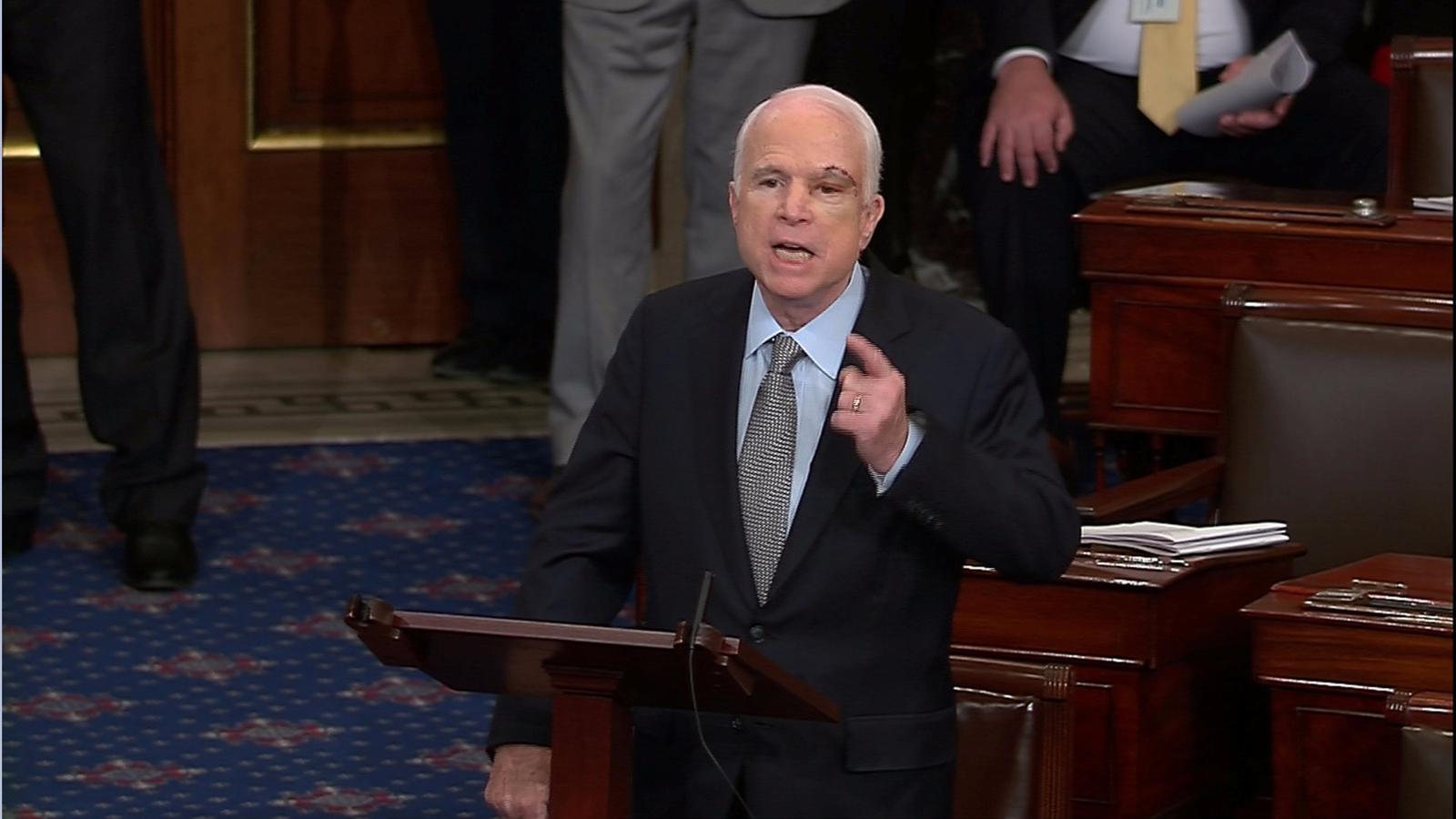After vote, Senate to proceed with health care debate
A still image from video shows US Senator John McCain (R-AZ), who had been recuperating in Arizona after being diagnosed with brain cancer, speaking on the floor of the Senate after returning to Washington for a vote on healthcare reform on July 25, 2017.
The US Senate voted Tuesday to proceed with a debate on Republican plans to repeal Barack Obama's health care reforms — proceedings marked by the dramatic return of John McCain, who is suffering from cancer.
The vote was a victory for President Donald Trump, who spent weeks cajoling, strong-arming and warning Republicans to get on board with his effort to overhaul Obamacare.
Despite the vote, several Republicans remain skeptical about how the new plan could affect millions of Americans.
In recent weeks, several measures have been considered — but ultimately collapsed, revealing fissures within the Republican Party on how to reach a goal they have had since the Affordable Care Act was passed in 2010.
"This was a big step," Trump said shortly after the vote at a press conference in the White House Rose Garden, calling Obamacare a "disaster for the American people."
Senator John McCain, who announced last week he is suffering from brain cancer, cast a vote for the measure, leaving the total at 50-50.
All 48 Democratic and left-leaning senators voted against, along with Republicans Susan Collins and Lisa Murkowski.
Vice President Mike Pence broke the tie, as the US Constitution calls on him to do in such a case.
McCain received a standing ovation from his colleagues as he entered the chamber, having made the trip from his home state of Arizona, where he was convalescing.
He called for more bipartisan cooperation in the days ahead, saying "Why don't we try the old way of legislating in the Senate, the way our rules and customs encourage us to act?"
Shortly before the vote, about 20 protesters burst into the Senate's public gallery in a bid to interrupt the proceedings, shouting "Shame!" before being removed by Capitol police.
Tuesday's vote was only a first step. Senators will now launch into long hours of debate, with Republican conservatives and moderates divided over how to proceed.
'First step'
The latest Republican plan would dismantle Obamacare but delay actual implementation of the repeal to allow time for a viable replacement to be crafted.
That bill is unlikely to ultimately pass in its current form, but the Senate leadership insisted on the importance of at least voting on it in order for changes to then be introduced.
"We can do better than Obamacare," said Senate Majority Leader Mitch McConnell, who highlighted McCain's return as he urged fellow Republicans to close ranks.
"Today's vote to begin debate is the first step, and we should take it."
On Monday, in a stark warning to fellow Republicans, the president bluntly declared "Obamacare is death" and that the Senate must act.
"Any senator that votes against starting debate is telling America that you are fine with the Obamacare nightmare," he added.
'Hard, calculated rhetoric'
Trump has repeatedly grilled fellow Republicans for not following through on their — and his — campaign pledge to repeal and replace Obamacare.
As some Republicans expressed frustration with the process and skepticism about what the Senate might pass, others were eager to see where colleagues stood.
"Now is the time to prove that our rhetoric of the past seven years regarding the repeal and replacement of this disastrous bill will lead to substantive action," Senator Ted Cruz said in a statement.
On the Democratic side, senators urged cooperation — and restraint.
"I can't believe this process and the hard and calculated rhetoric we see," Democratic Senator Joe Manchin of West Virginia said Tuesday.
"The Affordable Care Act is not a perfect piece of legislation. It needs repair. We both agree to that. Then we need to fix it."
Secretive process
Forecasts by the non-partisan Congressional Budget Office on various health reform bills have predicted that millions of Americans would lose health care if the measures become law.
In the case of a bill that repeals Obamacare and provides no replacement, 32 million more people would be uninsured by 2026 as compared to current law, CBO forecast.
Some Republicans have expressed concern with how legislation would impact Medicaid, the health insurance program for the poor and the disabled.
The latest repeal-and-replace bill would roll back an expansion of Medicaid and slash its federal funding.
It would also end the mandate that most individuals have health insurance, and allow states to let insurance companies offer bare-bones plans not allowed under current law.
Democrats have blasted the secretive process, accusing Republican leaders of rushing a mammoth bill to the floor without sufficient discussion or debate.
Several outside health groups have criticized the various iterations of the repeal-and-replace effort.
One of the most emphatic rejections came from a group of some 7,000 Catholic nuns, who wrote Senate leaders on Monday to say the bill "would be the most harmful legislation for American families in our lifetimes."
The story you just read is accessible and free to all because thousands of listeners and readers contribute to our nonprofit newsroom. We go deep to bring you the human-centered international reporting that you know you can trust. To do this work and to do it well, we rely on the support of our listeners. If you appreciated our coverage this year, if there was a story that made you pause or a song that moved you, would you consider making a gift to sustain our work through 2024 and beyond?
